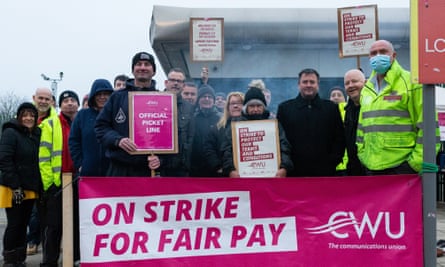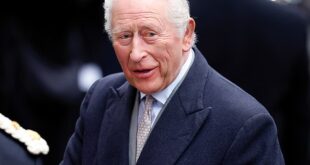The queue of 10 or so people clutching parcels stretches out into freezing fog rolling down Gloucester Road in Bristol. Inside the warm post office, there are plenty of mild-mannered complaints about the delays and threadbare services that define late-Tory-era Britain.
But perhaps the most striking thing – amid the grumbles – is the overwhelming support for postal workers taking action over real-terms pay cuts.
“In the old days, posties were really part of the community. They used to check up on people. Now you see them, they just have to run down the street to meet their targets,” says Juliet Harvey, 72, a retired teacher. She is clear about who is responsible for the dispute, which will see six more days of strike action in December, adding to growing Christmas backlogs in sorting offices.
“Everything is being run down in this country. It’s all owned by people with lots of money. The Royal Mail chief executive is raking in huge amounts and he’s saying he can’t afford to pay his workers,” she says. “It’s ridiculous.”
Annoyance is also on display in the Gothic grandeur of Bristol Temple Meads station, but again it is those at the top who are held most responsible, not the workers. The mid-morning London train has just been cancelled and passengers are scanning information boards or checking their phones for alternatives.
For many, this kind of disruption has become the norm. “There are just constant train cancellations and bus replacement services,” says Tim Geoghegan, 55, who is on the way to see his partner. “There was a points failure yesterday. It’s getting worse. You just never know.”
He does not blame rail workers, who are planning eight more days of strike action before the end of January, for how unreliable the rail network has become. “I know people do not strike easily. I blame the train companies and the government for not taking control.”
In the distance, a lone ambulance siren can be heard – but many of the city’s ambulances are stuck in queues outside hospitals waiting for beds to become available.

“We are missing heart attacks. We’re missing strokes. It’s horrific,” says Ben Clark, 56, who has been working as a paramedic for almost 22 years. “People are being harmed and dying because we are not getting there in time. The major reason is bed-blocking in hospitals causing ambulances to get stuck.”
Like thousands of other paramedics, Clark has voted for strike action, as the NHS and the rest of the country faces a long, hard winter.
On bonfire night this year, senior officials at the Royal College of Nursing (RCN) were deliberating on the initial results of a ballot of 300,000 members on industrial action.
The results looked incendiary. “We thought we’d done well,” said one official. “But we didn’t realise that we had done that well.”
The nurses’ strike is now in the vanguard of widespread industrial action supported by workforces across the country who are similarly anxious and angered at the erosion of the real-terms pay and working conditions over the past 15 years.
Malcolm Bennison, 37, a nurse at a hospital trust in central London who voted in the RCN ballot to strike, said: “When I go to the accident and emergency department, it is so full there is almost nowhere to put the patients. They are sitting in chairs, or being put in corridors or storerooms or places that used to provide clinical care.
“No one who goes into nursing expects to drive home in a sports car or holiday on a superyacht, but we expect to be able to pay our bills and have the tools to do our job.”
Almost every major public service in the country will be affected in the next few weeks by the rolling strikes. The Unite union said last week baggage handlers at Heathrow Airport would start a 72-hour strike action on 16 December. More than 100 security staff at Eurostar are striking for four days in the run-up to Christmas.
The rail network will be hit by several days of strike action in December. The trade association UK Hospitality has warned restaurants and bars could lose as much as £1.5bn as a result of the action.
For many, the strikes are likely to derail some Christmas festivities, wreck travel plans and delay gifts in the post. Royal Mail, also facing strike action, has brought forward its posting dates for Christmas by about a week.
The GMB and Unison announced last week that ambulance staff, having voted for industrial action, are likely to strike before Christmas. Other employees, including junior doctors, are balloting in the new year.
Matthew Taylor, chief executive of the NHS Confederation, urged the government and unions to get round the table to get through the challenge of the winter months.
He said: “The impact [of industrial action] will mainly be on routine appointments, but the longer it goes on the more it stores up problems and adds to the waiting lists.
“Even if we didn’t have ballots for strikes, we would still have a crisis in the NHS in recruitment, retention and motivation. There is a sense among NHS leaders of this vicious cycle where the vacancies make the work even harder and it leads to more people walking away.”
This weekend, as nursing unions lay plans for two days of strikes before Christmas and more industrial action is threatened across the rail network and much of the public sector, the Conservative government at Westminster, led by Rishi Sunak, is searching for a political message with which to rescue its fortunes and turn public opinion back in its favour.
After 12 years of Tory government, the economy is heading into recession. Inflation is soaring and interest rates rising. The disaster of the Liz Truss government has destroyed the party’s reputation for economic management. The Conservative party is divided into tribes and many of its MPs are quitting in despair.
The damage to the economy as a result of Brexit is becoming clearer by the day. Labour is far ahead in the polls. The Tories are struggling to find a story to tell.
Archie Bland and Nimo Omer take you through the top stories and what they mean, free every weekday morning
The situation is arguably most desperate in the NHS as winter sets in and staff leave because they can earn more elsewhere. Vacancies across the NHS in England have risen to a new record high, with more than 133,000 full-time equivalent posts unfilled. This is the highest number ever seen in records that date back to June 2017, and is up 29% year on year from the 103,809 vacancies reported at the end of September 2021.
Against this dire backdrop for the Conservative party, unions are determined to advance their members’ cases for inflation-related pay rises. And, as they do so, the Tories seem to sense a chance.
Last Wednesday, at prime minister’s questions, the Labour leader Keir Starmer asked Sunak why his government was giving tax breaks to private schools. The prime minister veered dramatically off the subject in his answer so that he could deploy a prepared line. “During Covid, the leader of the opposition wanted to keep schools closed – but we should not be surprised, because I listen to parents and he listens to his union paymasters.”
The big health unions, the RCN, Unison and the GMB, say ministers are now refusing even to engage in detailed talks on pay and instead just resort to political games – and are deliberately picking fights when in reality there are deals to be done.
“They actually want to take us on. They want to use the prospect of strikes to bash the Labour party,” said one senior union negotiator who has been in talks at the highest level. “They think we won’t go on strike, that we will give in. The frustrating thing is that we want a deal. They don’t appear to.”
The RCN held talks with the health secretary, Steve Barclay, for the first time after the union announced the results of its strike ballot on 9 November. But sources say that at the meeting Barclay refused even to discuss the union’s demands for pay rises, turning the subject to other matters such as body cameras for NHS staff, and care funding, which they had not come to talk about.
“He was not prepared to go there at all,” said someone close to the talks. A second meeting was also considered unproductive by union officials.
Wes Streeting, Labour’s health spokesman, says it is clear that ministers are deliberately “spoiling for a fight”. Government officials say, on the other hand, that the unions’ pay demands are extreme and unaffordable. The transport secretary, Mark Harper, said recently that the government did not “have a bottomless pit of taxpayers’ money”, hinting that further disbursement of cash would have to be linked to reforms.
So as the dystopian vision of a country unable to function comes into view, who is winning the key battle for public opinion? Is the Sunak ploy of trying to blame Labour and the unions – demonising them as Margaret Thatcher successfully did during the miners’ strike almost 40 years ago – paying dividends?
An Opinium poll for today’s Observer suggests not. It finds that 57% of people surveyed support nurses going on strike for two days this month – on 15 and 20 December – while 30% are opposed. And almost twice as many people blame the government for the pending strikes (42%) as the health unions (23%). As for the rail strikes, opinion is more divided. About 40% think the government (23%) and train companies (17%) are most to blame, with 37% holding the unions principally responsible.

Pat Cullen, the RCN’s general secretary and chief executive, told the Observer on Saturday that Barclay himself was to blame for the strikes, and even hinted that a deal was there to be done if only the government in Westminster was prepared to show the same flexibility as SNP ministers in Scotland had already displayed.
“By refusing my requests for negotiations, Steve Barclay is directly responsible for the strike action this month,” Cullen said. “Nursing staff don’t want to be outside their hospitals, they want to be inside – feeling respected and able to provide safe care to patients.”
She added: “Our Scottish members will begin voting this week on a new offer that came from negotiations there. This must be a lesson to ministers elsewhere that negotiations can avert action and pay offers are put out to members for a vote.”
In Scotland, the NHS pay increases offered by ministers would range from 11.24% for the bottom of salary band 2 to 5.56% for the top of band 7. Unison is recommending to their members in Scotland that they accept the offer; the RCN is not actively recommending acceptance but is asking its members whether they want to take up the offer.
Wilma Brown, who chairs Unison’s Scottish health committee, and who was involved in negotiating the offer being recommended in Scotland, said union colleagues in England had told her that if they got an offer similar to that they “would bite their hands off for it”.
The general secretary of Unison, Christina McAnea, said: “It’s in the gift of the government to stop strikes across the NHS this winter. But that means ministers must start talking to unions about pay. Only with better wages will experienced health workers stop leaving the service, record vacancy rates reduce and waiting lists shorten.”
Back in Bristol, Ben Clark, like thousands of other paramedics, is preparing to strike. He too believes the government could afford to better fund the NHS. He is especially concerned about pay levels for emergency care assistants, who support paramedics and drive ambulances.
“It’s a political decision. Of course, there is money. The government could decide to fund the NHS,” he says. “They have been lying to us since austerity.”
Source link



